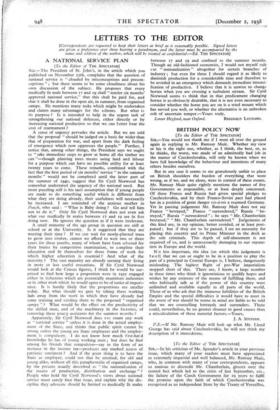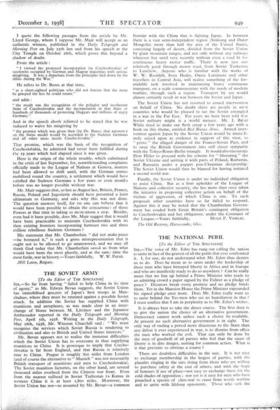[To the Editor of THE SPECTATOR] SIR,—In his criticism of
Mr. Spender's article in your previous issue, which many ,of your readers must have appreciated as extremely impartial and well halanced,..Mr. Ramsay Muir, who, in common with many of your correspondents, appears so anxious . to discredit Mr. Chamberlain, glosses, over the central fact which led to the crisis of last September, viz., the failure 9f the Czech Government for 19 years to fulfil the promise upon the faith of which Czechoslovakia was recognised as an independent State by the Treaty of Versailles,. I quote the following passages from the article by Mr. Lloyd George, whom I suppose Mr. Muir will accept as an
authentic witness, published in the Daily Telegraph and Morning Post on July 25th last and from his speech at the City Temple on October 26th, which prove this beyond a shadow of doubt.
From the article : " I viewed the proposed incorporation (in Czechoslovakia) of territories occupied by German and Magyar majorities with serious misgiving. It was a departure from the principles laid down by the Allies during the War." • He refers to Dr. Benes at that time, " as a short-sighted politician who did not foresee that the more he grasped the less he could retain." • and adds : " the result was the recognition of the polyglot and incoherent State of Czechoslovakia and the incorporation in that State of hundreds of thousands of protesting Magyars and millions of angry Germans." • And in the speech aboVe referred to he stated that he was induced to waive his misgiving by
" the promise which was given•then (by Dr. Benes) that autonon- y on the Swiss model would be accorded to the Sudeten Germans and all other races inside Czechoslovakia."
That promise, which was the basis of the recognition of. Czechosloirakia, he admitted had never been fulfilled during the 19 years which had elapsed since it was given.
Here is the origin of the whole trouble, which culminated in the crisis of last September, for, notwithstanding complaints officially made to the League of Nations at Geneva, matters had been -allowed to drift until, with the -German armies mobilised round the country, a settlement which would have satisfied the Sudeten Germans a few years or even months
before -was no- longer- possible without war. -
Mr. Muir suggests that, so late as August last, Britain, France, Russia, Poland and Jugoslavia should have presented a joint ultimatum to Germany, and asks why this was not done. The question -answers itself, for no one can believe that it would have been possible to' obtain the concurrent: of those Powers at that time in taking so mcmtntous a step. Besides, even had it been possible, does Mr. Muir suggest that it would have been practicable to maintain Czechoslovakia with its then existing frontiers incorporating betw6en two and three million rebellious Sudeten Germans ?
His statement that Mr. Chamberlain " did not make peace —he betrayed it," is such a gross misrepresentation that it ought not to be allowed to go unanswered, and we may all thank God today that Mr. Chamberlain saved us from what would have been the most ghastly, and at the sam:.- time the most futile, war in history.—Yours faithfully, W. W. PAINE.
Mill Lawn, Reigate.



























































 Previous page
Previous page